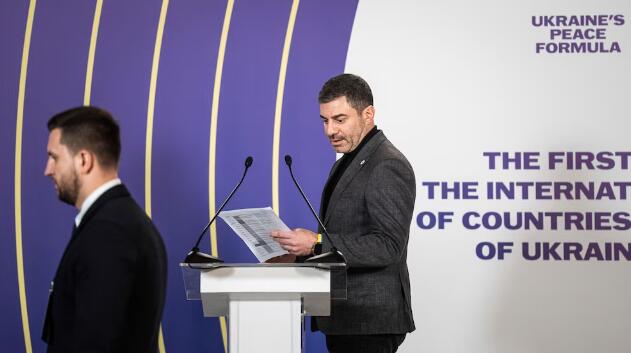Ukraine’s human rights ombudsman voiced hope Friday that a coalition of countries formed to facilitate the return of Ukrainian children illegally deported by Russia will be able to come up with a faster mechanism to repatriate them. Over 19,000 children are still believed to be in Russia or in occupied regions of Ukraine.
Dmytro Lubinets spoke to reporters following the first meeting of the National Coalition of Countries for the Return of Ukrainian Children, which was formed based on a recommendation by Canada, in Kyiv.
He said Russia continues to deport Ukrainian children to the territories it controls, citing information his office has received. This effort earlier this year prompted the International Criminal Court to issue arrest warrants for Russian President Vladimir Putin and his envoy for children’s rights, Maria Lvova-Belova.
Judges at the ICC said they found “reasonable grounds to believe” the two were responsible for war crimes, including the illegal deportation and transfer of children from occupied Ukrainian regions to Russia — something an Associated Press investigation detailed earlier this year.
Russia has dismissed the warrants as null and void, arguing that it doesn’t recognize the jurisdiction of the ICC, but Ukraine welcomed them as a major breakthrough.
Lubinets said Friday that Kyiv wants “the arrest warrants from the International Criminal Court to not stop.”
“Not only these two persons participated in the deportation of Ukrainian children. According to our data, this is a fairly large number of representatives of the Russian Federation who have done this and are still doing it,” he said.
Lubinets acknowledged that Russia has been more willing to return children after the warrants. But challenges remain vast. So far, Russia only returns children whose location and identities have been verified by Ukrainian officials, a difficult task especially for Ukrainians orphans.
He also raised the alarm that children were now being deported via Belarus, saying that his office was “finding more and more facts” of that, and expressed concern that young Ukrainian boys in Russia were being primed for the Russian military, with data about them being collected by military enlistment offices for future conscription into the army.
Lubinets said the first meeting of the coalition had “highly positive results,” but urged it to “find concrete mechanisms to return Ukrainian children.”
This means finding a mechanism to identify Ukrainian children held by Russia, the process of return, and financial support and assistance when they are back on Ukrainian soil, he said.
Returns are possible only after “we show documents, have official Ukrainian guardians and we know where the child is in Russia,” said Lubinets. “After that some progress goes on and we talk substance.”
“We have a big number of children now in process of discussion and return. I hope in the nearest future we will see positive results,” he said, not elaborating on the number of children.
